- Home
- Susan Hill
Dolly Page 2
Dolly Read online
Page 2
I fell asleep thinking about the two of them, and about Leonora and how anxious I had been about the way she behaved, when we were children, how she had seemed so careless about bringing wrath down on her own head and curses on the house in general.
I woke and put on the bedside lamp. It was deathly quiet. Obviously the fog had not lifted but was swaddling the land, deadening every sound. Not that there would be many. Cars did not drive around Cold Eeyle at night, people did not walk the streets.
I was about the pick up my book and read a few more pages to lull myself off again, when my ears picked up a slight and distant sound. I knew what it was at once, and it acted like a pick stabbing through the ice of memory. It was the sound of crying. I got up and opened the window. The taste of the fog came into my mouth and its damp web touched my skin. But through its felted layers, from far away, I heard it again, half in my own head, half out there, and then everything came vividly back, the scene with Leonora in Aunt Kestrel’s sitting room, her rage, the crack of the china head against the fireplace, my own fear, prompting my heart to leap in my chest. All, all of it I remembered – no, I re-lived, my heart pounding again, as I stood at the window and through the fog-blanketed darkness heard the sound again.
Deep under the earth, inside its cardboard coffin, shrouded in the layers of white paper, the china doll with the jagged open crevasse in its skull was crying.
PART TWO
2
Two children were travelling, separately from different directions, to Iyot House, Iyot Lock, one hot afternoon in late June.
‘Where am I to put them?’ Mrs Mullen had asked, to whom children were anathema. ‘Where will they sleep?’
Kestrel, the aunt, knew better than to make any suggestion, the housekeeper being certain to object and overrule.
‘I wonder where seems best to you?’ Images of the bedrooms flicked in a slide show through Aunt Kestrel’s mind, each one seeming less suitable than the last – too dark, too large, too full of precious small objects. She had no experience of young children, though she was perfectly well disposed to the thought of having her great nephew and niece to stay, and had a vague idea that they were easily frightened of the dark or broke things. And were they to sleep in adjacent rooms or with a communicating door ? On separate floors ?
‘The attics would suit best, in my view,’ Mrs Mullen said.
Shadowy images chased across Kestrel’s mind, troubling her enough to make her get up from her writing desk. ‘I think we had better look. I can’t remember when I was last up there.’
She went through the house, three flights of wide stairs, one of steep and narrow. Mrs Mullen did not trouble to follow, knowing it would all be decided satisfactorily.
The summer wind beat at the small latched windows but daylight changed its nature, making it seem a soft wind, and benign. The floorboards were dusty. Kestrel opened a cupboard set deep into the wall. The shelves were lined with newspaper and smelled of nothing worse than mothballs and old fluff. One of the rooms was completely empty, the second contained only a cracked leather trunk, but the two rooms next to one another, in the middle of the row, had furniture – an iron bed in each, a chest of drawers, a mirror. One had a wicker chair, one a musty velvet stool. And cupboards, more cupboards. She had lived here for over forty years and remembered a time when the attic rooms had been for maids. Now, there was Mrs Mullen, who had the basement, and a woman who came on a bicycle from a village on the other side of the fen.
The rooms could be made right, she thought, though vague as to exactly what children might need to make them so. Curtains? Rugs? Toys?
Well, linen at least.
‘The attics,’ she said, coming down from them, ‘will do nicely.’
Kestrel Dickinson had been an only child for fourteen years before two sisters were born, Dora first and then Violet. Dora was plain and brown-eyed with brown straight hair and placid under the spotlight of everyone’s attention. Their mother tried to conceal her disappointment, firstly that Dora was not a boy and secondly that she was not beautiful, though her love for both girls was never in doubt. Violet was born two years and two days after Dora and grew into a pert and extremely pretty child, with blonde bubble curls and intensely blue eyes, and was adored. She smiled, lisped, talked early, looked beautiful in frills, never got her clothes dirty, and laughed with delight at everyone who looked in her direction.
From the first Dora hated her and Violet learned quickly to meet like with like. As they grew into children and then young women, they quarrelled and despised one another. From the beginning the root of it all was Dora’s jealousy, but Violet, who had had her head turned early, quickly turned proud, self-absorbed and boastful. In her turn, Dora behaved with pettiness and spite. Their feud became life-long. Violet married when she was eighteen, and again, at twenty-five and thirty-three. After that she had a succession of lovers but did not bother to marry them. When she was forty-two, she had her first and only child, Leonora, by a rich man called Philip van Vorst, before she embarked on eight years of restless travel, from Kenya to Paris, Peking to Los Angeles, Las Vegas to Hong Kong. Her daughter travelled with her, growing quickly used both to their nomadic life, a succession of substitute fathers, hotels, money and, like her mother, being pretty, spoilt, admired and both lonely and dissatisfied.
Violet rarely returned home, but whenever she did, she and Dora picked up their animosity where it had been left, always finding fresh things about which to quarrel. Violet’s frivolous, amoral, butterfly nature infuriated her sister. She knew she behaved better, led a more wholesome life, but never managed to feel that these counted for anything when her sister arrived home showering presents out of her suitcases. The adoration she had always received shone out again from parents, servants, friends, everything that had been complained of was set aside. Dora, plain and brown, simmered in corners and, long into adult life, plotted obscure revenge. Violet had had three husbands, innumerable lovers – usually handsome, always rich – and a daughter with enviable looks. Dora had had one rather anonymous suitor who had never confessed any feelings for her and who had eventually faded from her life over a period of several months, while she remained waiting in hope.
By this time, Kestrel was long married and living at Iyot House, though she did not have children of her own and had detached herself from her feuding sisters, but had never stopped feeling guilt that she had not somehow succeeded in uniting them.
And then, in the flurry of less than three months, Dora had met and married George Cayley, a local widower almost thirty years her senior. A year later she had produced her small, frail son, Edward. Two years later both she and George were dead.
Kestrel inherited Iyot House from her own husband after a short marriage. At first she had disliked it and the expanse of dun-coloured fens, their watery aspect and huge oppressive skies, the isolation and lack of friends, the oddness of the villagers. In time, though, she grew used to it and found some sort of spirit half-hidden there. She had people to stay in the spring and summer and for the rest of the year was happy with her own company and her painstaking work as a botanical illustrator.
From Violet there came the occasional, erratic postcard which rarely mentioned her daughter Leonora but she heard nothing of her orphaned nephew until a letter had come asking if he might spend the summer at Iyot House. In some desperation she wrote to Violet.
‘They are cousins after all and he will need a companion.’
It was settled.
3
Edward Cayley,’ he wrote in the steamed-up train window. ‘Edward Laurence Cayley.’ Then rubbed it out with his sleeve.
He had been driven from the house by his half-brother’s business chauffeur and hurried across the concourse of Liverpool Street as if he must be bundled out of sight as quickly as possible. The driver carried his case; he carried a small hold-all. The station smelled of smoke, which tasted on his tongue and caught the back of his throat. His hold-all and suitcase had labels tied on with his name and
the station to which he was travelling. He was put in charge of the guard, inspected, turned round, and then put into the van.
‘Two hours.’ The guard had several missing teeth and the rest were brown.
After that, there was nothing. No one looked at or spoke to him, he had nothing to eat or drink. The train steamed on. He saw cows and churches, fields and houses, dykes and people on bicycles. He did not think and he did not feel, he simply accepted, having learned that accepting was the best and safest way.
He was neither happy nor unhappy: he was a frozen child, as he had been since he had arrived at the house of a half-brother who neither loved nor wanted him but who, with his wife, had looked after him dutifully, without fault or favour.
He was a pale, fair, thin boy, small for his age but fit and wiry now and with a sensitive and intelligent face. He was liked. It was taken for granted that he would find his way easily in life, that excuses would never need to be made for him.
But, looking out at the cows and sheep and churches and dykes and people on bicycles, he was unaware of any of this. He wrapped himself in a bubble of unknowing.
Leonora van Vorst travelled alone from Geneva the same day, with her name on a badge pinned to her coat and a brown suitcase covered in shipping line labels, thrown from porter to porter and, finally, to the driver of a hire car which was to take her from Dover to Iyot Lock. To anyone watching her follow the last porter with her case on his shoulder and her round overnight bag in his left hand, across the dock from the boat, she looked small, solemn and lost, but within herself, she was tall, confident and superior. She had money inside her glove for the last tip. The driver loaded her cases and pinched her cheek, feeling sorry for what he thought of as ‘the little mite’. Leonora frowned and climbed into the back of the car without speaking. She was self-possessed, calm, haughty, and without any sense that there was such a thing as love, or vulnerability.
The car sped east and after only a few miles she began to feel sick, but fearing to mention it, and seem weak, she closed her eyes and imagined a sheet of smooth black paper, as her mother had once taught her, and eventually the nausea faded and she slept. Through the rear mirror the driver saw a white-faced child with a halo of red hair spread behind her on the back of the seat, lips pinched together and an expression he could not exactly make out, partly of detachment, partly of something like defiance.
4
How do you do?’ The boy put out his hand, Aunt …’ But his voice wavered on the ‘Kestrel.’
‘Lord, I’m not your aunt. You’d better come in.’ Mrs Mullen looked down at the boy’s bags, both small. The taxi had already turned and started down the long straight road twelve miles back to the station.
‘Well, pick them up.’ She had no intention of waiting on two children.
‘Oh. Yes.’
She did not know how a boy of eight should look but Edward Cayley seemed thin, his knee-caps protruding awkwardly from bony little legs. His hair was freshly cut, too short, leaving a fringe of bristle on his neck.
‘Put them down there.’
‘Yes.’
They stood in the dimness of the hall staring at one another in silence for a full minute, Mrs Mullen struck by an unfamiliar sympathy for a child who was not like the few children she had known, who had been sturdy, loud, greedy, grubby and disrespectful. That was how village children were. Edward Cayley was the opposite of all those things and though she did not yet know about his appetite, no boy so thin, and pale as a peeled willow, could surely be a big eater.
Edward looked at Mrs Mullen, and then at his own feet, knowing that staring round a strange house was impolite. He could think of nothing to say, though he wondered who the woman was and where his Aunt Kestrel was, while knowing that the behaviour of adults was generally inexplicable.
The house smelled strange, half of living, breathing smells, half of age and damp.
‘Wait there.’
‘Yes.’
The woman disappeared into the dimness and a door bumped softly shut. He waited. All he knew was that Aunt Kestrel was related to the dead mother he did not remember and that he was stay with her at Iyot for some weeks of this summer. He supposed that was enough.
In her dressing room, Kestrel adjusted her necklace, wondered if she should change it for another, put up her hands to the clasp and froze. The boy was here, and she was anxious. She had seen him once, as a baby of a month old, she did not know what he would be like and she was unused to children, but she was not innately hostile to them like Mrs Mullen. She wanted to make the boy comfortable, for him to talk to her, find entertainment, not be homesick or bored and now that he was here, her nerve failed her. But at least he would not be lonely.
The house was silent. Mrs Mullen had announced Edward’s arrival and then disappeared. Aunt Kestrel, as she must now think of herself, replaced the necklace and went downstairs.
They had lunch in the dining room, he and the aunt, and he sat quiet, pale and watchful, eating everything he was offered quite slowly, made nervous by the room itself, with its heavy red curtains held back by brass rods, and large portraits of men with horses and dogs and women with hats and distant children.
‘Are you enjoying your lunch? Is there anything else you would like?’ He sensed with surprise that his aunt was as nervous as he was, and far more anxious to please. His own wish was more negative – not to annoy anyone, not to provoke irritation, not to be chastised, not to break anything. He had been warned so many times about the breaking of objects, of china and ornaments and even windows, that he was in a state of suspended terror, passing by the dresser with its huge dishes, small tables with glass paperweights and gilded figurines.
‘Is your drink too strong?’
‘It’s very nice, thank you.’
It was lemon squash diluted so much that the water was barely tinted.
‘Do you like lamb chop?’
‘Yes, thank you.’
‘And how was your train journey? Were you properly looked after?’
‘Yes, thank you. I travelled in the guard’s van with the guard.’
‘Quite right. But was that uncomfortable?’
It had been. He had been forced to sit on someone’s leather trunk, next to cardboard boxes of live chicks which chirped and rustled about and then went still, until they were put out onto a station platform somewhere. But the guard had shared a chocolate bar with him and told him stories about famous railway murders and ghosts in tunnels.
‘It was very nice, thank you.’
He looked up from his plate at Aunt Kestrel just as she looked straight at him. They took one another in. She looked old to him, with a tweedy skirt and a buttoned blouse, and several rings on her left hand, but her face was soft and not at all unkind.
To her, the boy was alarmingly like his mother in profile, with the same long straight nose and small mouth, but his full face was like no one she recognised. He was nervous, polite and private, his true thoughts and feelings all his own and kept hidden. His manner deterred any questions other than those about the food and drink and his journey.
‘Your cousin Leonora will come tomorrow. Have you met her before?’
He shook his head, his mouth full of pears and custard.
‘I thought not. She is your Aunt Violet’s only child – Violet and your mother were sisters and … well, and I was sister to them both, of course. But older. Much older.’
He said nothing.
‘So you are quite close in age. I hope you’ll get on.’
He did not know what to say, having no sense at all of what it might be like to spend a whole summer with a girl cousin he had never seen.
‘What would you like to do now? Do you have a rest after lunch? I’m afraid I’m not used to – to what children … boys … do. Have you brought any books to read or do you play with … Or you could go into the garden.’
He followed her into the hall. ‘But I expect you’d like to see your room and so on now.’
&n
bsp; ‘Thank you.’
Mrs Mullen appeared from behind a baize-covered door.
‘I’ll take him up then shall I?’
He did not want her to but could not have said and they all three stood about uncertainly for a moment.
‘Well, perhaps I should … you carry on with the dining room, Mrs Mullen.’
He noted the name.
‘Pick those up then,’ Mrs Mullen said, pointing to his bags, the small one and the very small.
‘Yes.’
Edward picked them up and followed his aunt to the stairs.
5
At what time should you go up?’
Edward looked up from the solitaire board. Aunt Kestrel had unlocked a cupboard in the drawing room, whose blinds were pulled down all day as well as at night, and found the solitaire, a shove ha’penny board and a pile of jigsaw puzzles which he taken up to the attics. He examined the glass marbles again. They were wonderful colours, deep sea green, brilliant blue, blood red, and clear glass enclosing swirls of misty grey. The board was carved out of rosewood with green velvet covering the underside.
‘Do you have something to eat first, or …’
‘I have milk and two biscuits at seven and then I go to bed.’
‘Of course, these are the holidays; I daresay rules should be stretched. When would you like to go up?’
The idea that he could choose his own time, that routine was not made of iron but could be broken, was not only new but alarming.
‘I am quite tired,’ he said, moving a blue marble over a clear glass one, to leave only seven on the board. His aunt had shown him how to play and as it had been raining, he had done so, sitting beside the window, for most of the afternoon. Seven was the smallest number he had got down to without being unable to move again.
‘You have had a rather dull day.’
‘It has been very nice, thank you.’
Kestrel was taken aback again by the opaque politeness of the child.

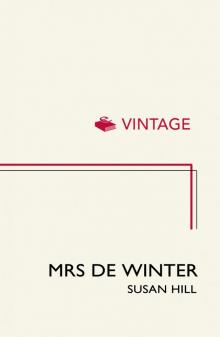 Mrs De Winter
Mrs De Winter A Question of Identity
A Question of Identity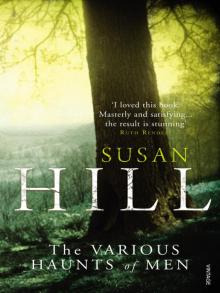 The Various Haunts of Men
The Various Haunts of Men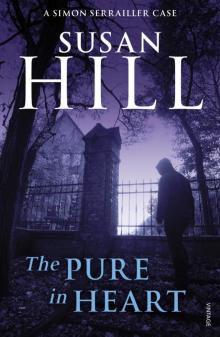 The Pure in Heart
The Pure in Heart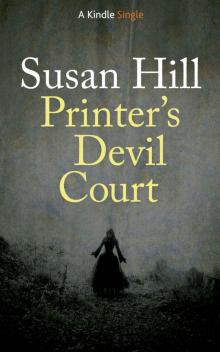 Printer's Devil Court
Printer's Devil Court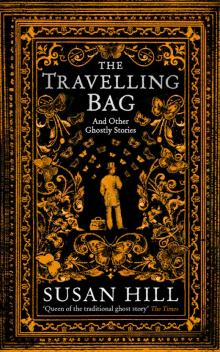 The Travelling Bag
The Travelling Bag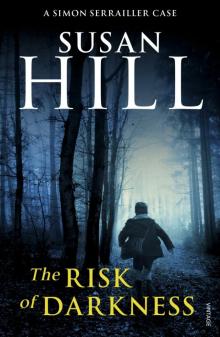 The Risk of Darkness
The Risk of Darkness A Kind Man
A Kind Man Black Sheep
Black Sheep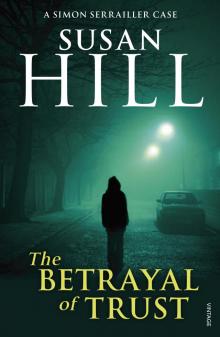 The Betrayal of Trust
The Betrayal of Trust The Service of Clouds
The Service of Clouds Betrayal of Trust
Betrayal of Trust The Small Hand
The Small Hand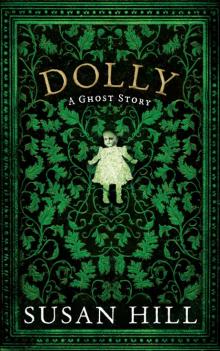 Dolly
Dolly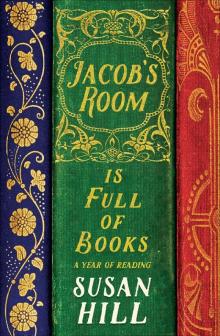 Jacob's Room Is Full of Books: A Year of Reading
Jacob's Room Is Full of Books: A Year of Reading The Vows of Silence
The Vows of Silence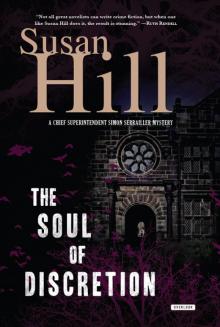 The Soul of Discretion
The Soul of Discretion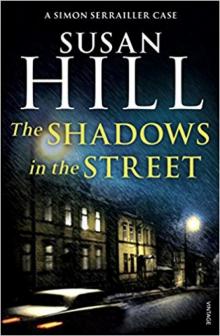 The Shadows in the Street
The Shadows in the Street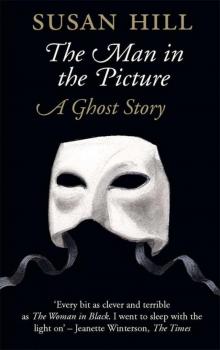 The Man in the Picture
The Man in the Picture Air and Angels
Air and Angels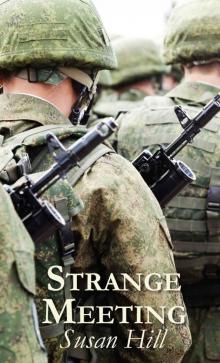 Strange Meeting
Strange Meeting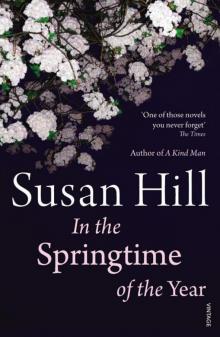 In the Springtime of the Year
In the Springtime of the Year Howards End Is on the Landing: A Year of Reading From Home
Howards End Is on the Landing: A Year of Reading From Home From the Heart
From the Heart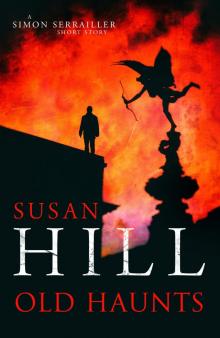 Old Haunts
Old Haunts The Mist in the Mirror
The Mist in the Mirror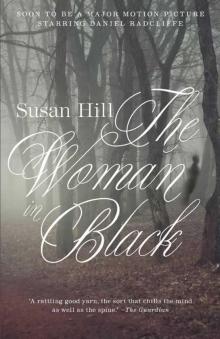 The Woman in Black: A Ghost Story
The Woman in Black: A Ghost Story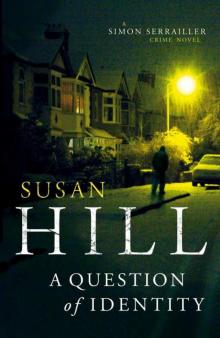 A Question of Identity (Simon Serrailler 7)
A Question of Identity (Simon Serrailler 7)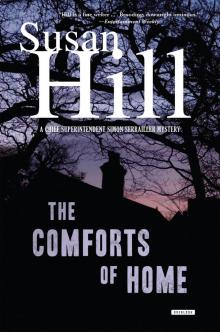 The Comforts of Home
The Comforts of Home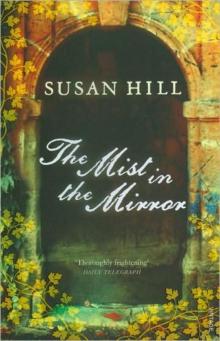 Mist in the Mirror
Mist in the Mirror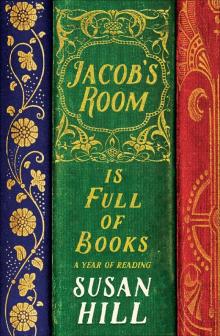 Jacob's Room is Full of Books
Jacob's Room is Full of Books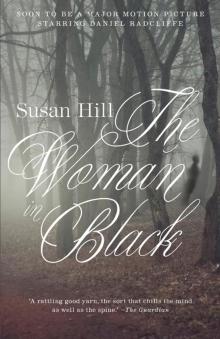 The Woman in Black
The Woman in Black Howards End is on the Landing
Howards End is on the Landing